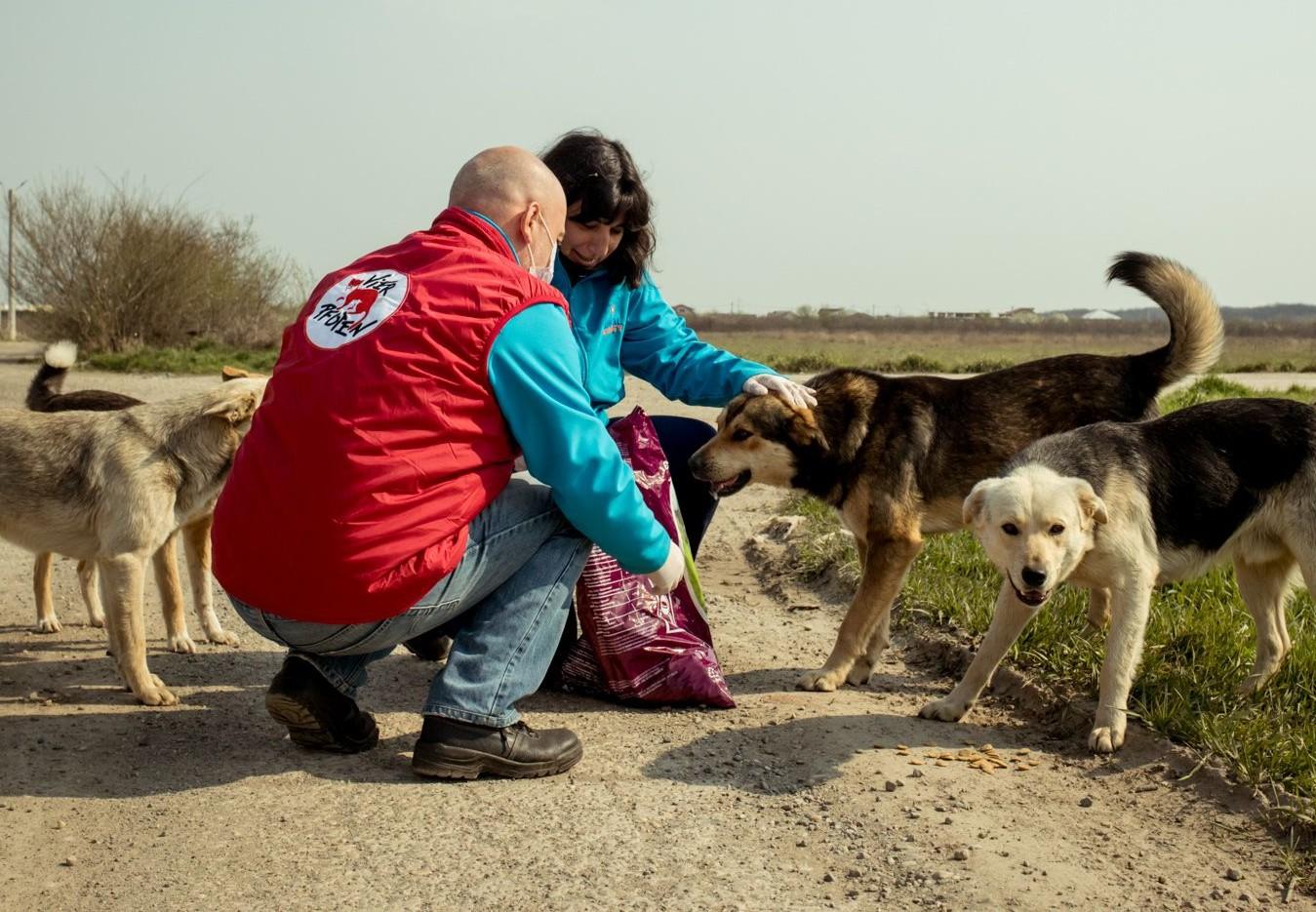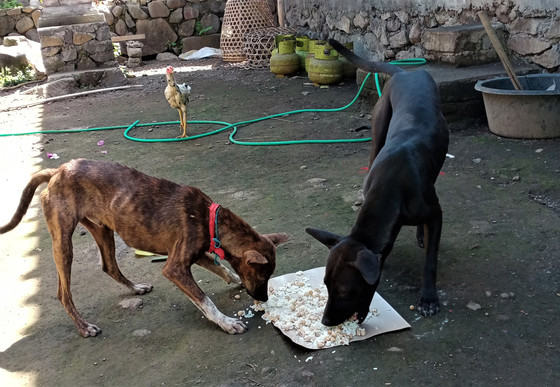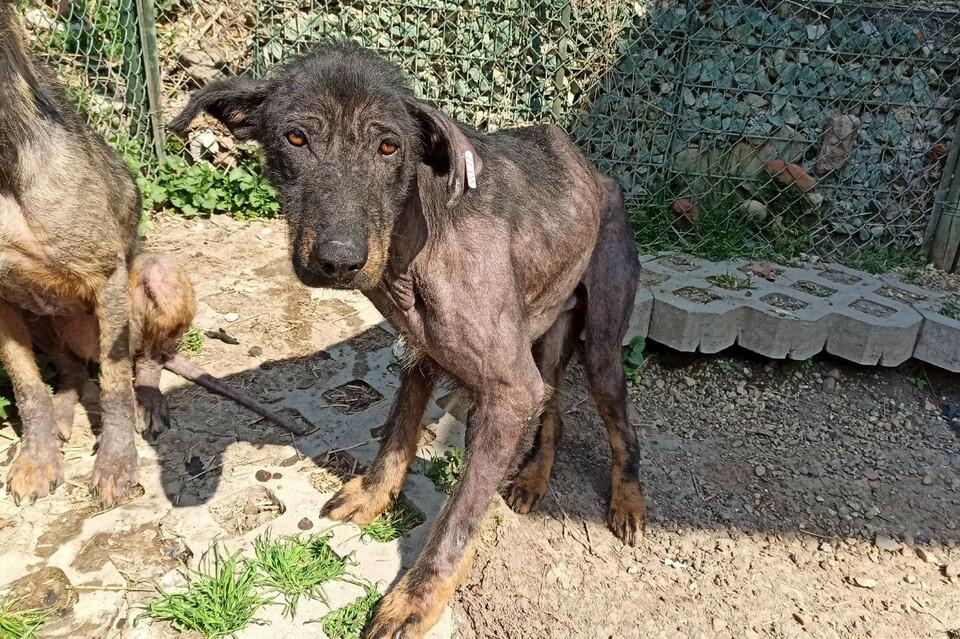
Covid-19 and Stray Animals
What a pandemic means for stray cats and dogs
COVID-19 has affected both people and animals alike around the world. As lockdown and physical distancing measures are enacted, more people are staying home, while restaurants and most markets are closed – both vital food sources for stray animals. The affect on stray animals is devastating as most are finding it increasingly difficult to find food.
In Eastern Europe, our teams are seeing increased desperation from hungry animals searching for their next meal. Whilst food isn’t the only struggle stray animals face in Southeast Asia, with the economic situation worsening, the theft of dogs and cats for the brutal meat trade is becoming more rampant.
The intake of animals abandoned at shelters is also increasing, creating greater strain on resources.
These challenging times call for urgent measures. FOUR PAWS is giving dogs and cats a lifeline, by feeding stray animals wherever possible, campaigning to end the dog and cat meat trade and addressing the challenging situations faced by local shelters.
Stay up-to-date:
Subscribe to our newsletter to receive the latest news and stories about our work now!
The year 2020 was a busy and challenging year for most us...
and our FOUR PAWS stray animal care teams are certainly no exception. Despite the almost insurmountable challenges, our dedicated teams have been working across the globe, helping animals who also suffered due to the global pandemic. Whilst tens of thousands of animals were helped, there are still so many more who need us. Our teams are currently on standby and ready to respond to whatever 2021 might have in store. Stay tuned for more updates!

Kittens in Cambodia
Kittens Sreymoa (black and white) and Pheakdey were in a rough shape when we found them: They had severe upper respiratory infections, and their eyes were glued shut from infections. Unfortunately, one of their siblings had already passed away before we arrived.
Luckily, these two still had a good appetite and a fighting will to live - as well as a local nun who wants to help them come through. We treated the kittens in the field, provided antibiotics and fluids and then prepared a care package for the nun consisting of special food, eye drops, and everything the kittens need to ensure a quick recovery. Hopefully, when we come back, we will see these two bustling with energy again!
Please keep up your support for our mission.

Feeding support in Cambodia
October, our teams provided additional feeding support to communities in need due to the ongoing COVID lockdowns and economic situation. Additionally to the virus related challenges, our team had to brave some severe flooding in the area. But in the end we made it and provided food for hundreds of animals.
Some good news: The animals are indeed healthier as a result of our program. Unfortunately, the team found several dead kittens who had been dumped at the pagodas and dogs with skin disease - which we of course treated right away.
We were shocked to hear that these dire times have drawn in some cat meat thieves: They play with the cats to earn their trust, and then put them in a cage and drive off...
We need your support to keep our feeding programme up and running!

Parvovirus and distemper outbreak on Bali
As if things weren't difficult enough on Bali with the Corona pandemic and its implication on the local animal population, the island has now been hit with the parvovirus and distemper. With our partner Bali Animal Welfare Association, we've had two small vet teams going door-to-door in outbreak areas and vaccinated upwards of 50 animals per day, per team.
Unfortunately, we've received word that over 55 dogs have died since the outbreak began, so we are trying to reach as many dogs as quickly as possible to protect them, find sick animals for treatment, and educate pet owners.
We are seeing first success stories already: Dog Blue (pictured) had nearly died of distemper after his owner reported him as having “flu like symptoms”. The outreach team treated him intensively with fluids and antibiotics, and he is now doing well and is fully vaccinated, sterilised, happy and healthy!

Thousands of much needed meals distributed, Bali
In many areas on the island, normal life has resumed for people, with restaurants, public places, and temples opening up. In places where we previously fed stray dogs, the feeding has been taken over by locals. Therefore, our teams were now able to target areas that were previously isolated and are now accessible - what we found were large numbers of dogs in need.
Many of these animals seem to have been forgotten about, left behind hungry, skinny and sick with severe skin diseases. Within two weeks, we were able to distribute 4,994 meals - and as you can see, they were badly needed!
Find out more about our Dharma programme.
Feeding the strays across Southeast-Asia
As the lock-down in much of Southeast-Asia continues, our teams are still busy were the care and feeding of many stray animals that were starving, as neither locals nor the missing tourists were able to provide for them anymore.
Help us to continue helping stray animals.

Feeding programme continues to the feed hungry mouths in Bali, Indonesia.
As travel restrictions remain in Indonesia, our team alongside Bali Animal Welfare Association is working hard feeding dogs hard hit by the collapse of Bali's tourism industry.
We've expanded it to new areas in East Bali, identifying remote areas where dogs are literally starving. From the 15th of June on, we've started involving local veterinarians and members of the local community who have been instrumental in assessing animal needs, helping distribute dog food and educating owners about animal welfare. Our feeding routes operate everyday, and many dogs have started to recognise our feeders and cars, and happily run towards us food. Soon we hope to restart our sterilisation clinics to help stop the births of unwanted puppies and kittens during this challenging time.
Read more about our programme to help stray animals in Indonesia.

Giving strays the help they need in Lutsk, Ukraine.
The SAC team in Ukraine is in Lutsk, sterilising around 150 dogs and continuing our cooperation with this municipality committed to approaching stray dog management in a non-lethal, humane way.
Last week, we were also able to rescue Molly – a beautiful young stray female who was diagnosed by our vet team with a pyometra. A pyometra is a serious and usually life threatening infection of the uterus, affecting up to 1 in 4 unspayed female dogs (and occasionally cats). Without treatment, she would have died a long and agonising death on the streets. Our vet removed the uterus, treated her with intravenous antibiotics for a week and now she is ready to move to a community clinic and get adopted by a loving family.
Support our project in Ukraine.

A model municipality - sustainable population control in Galati, Romania
In Romania our team is back in Galati, our community engagement model municipality, where community members have been working hard at developing their own sustainable plans on how to humanely curb the stray population in their city in the future. We are providing them with our Catch-Neuter-Vaccinate-Return (CNVR) services and support with neutering as many strays as possible with the aim of no more puppies being born on the streets of Galati.
Galati is a very poor area in Romania, but the people are really willing to make a difference and reach our long-term #zerostraydogs goal. They help our teams by directing them to locations where stray dogs live, even if that means we have to use alternative means of transport! We are aiming to sterilise an additional 400 dogs in June, bringing the percentage of sterilised dogs in the population in this city up to 80%.
There are plans to be back in Galati in autumn for a final sterilisation push and a dog count to show our impact on the stray dog population in this community.
Read more about our stray animal care programme in Romania.

Population control in the outskirts of Sofia, Bulgaria
Our team in Bulgaria is currently working in the city of Pernik, a city on the outskirts of Sofia, focusing on breaking the cycle of unsterilised pets breeding and the cruel abandonment of litters of unwanted puppies and kittens in boxes around the city.
With killing as a method of controlling stray populations being already illegal in Bulgaria and total numbers of stray dogs thankfully dropping due to sterilisation efforts of municipalities and NGOs, focusing on the source of abandonment is the next logical step in preventing more dogs becoming strays.
In this project we are sterilising and treating pets of low-income families for free, often providing them with the first and only opportunity in their lives to ever see a veterinarian. This also gives us an opportunity to educate families on the importance of responsible pet ownership and in many cases allows us to improve the welfare of the dogs and cats.
Please support their efforts here.

Stray animal feeding needed after collapse of tourism industry in Bali
Communities that rely on the tourism industry in Bali are suffering, and so we have teamed up with Bali Animal Welfare Association to provide desperately needed food to dogs in Karangasem Regency for the next 3.5 months.
This is an area which has had one of the highest numbers of recorded COVID-19 cases on the island. As a consequence, the situation is quite dire for many animals, with some strays surviving on dried corn kernels. There has also been an increase in the number of puppies and kittens being thrown away. The total number of animals fed up to now is 1,127 dogs and 13 cats. While we were there, we are also providing worm and skin treatments for some of our little patients.
Read more about our programme to help stray animals in Indonesia.

Trap-Neuter-Vaccinate-Return of 600 stray cats in Romania
With the COVID-19 measures finally being lifted in Romania, our Stray Animal Care team are allowed to start their normal activities again. As travel is still not possible across all parts of the countries we have decided to focus our efforts in the area around our clinic, so Bucharest. We are planning to Trap-Neuter-Vaccinate-Return 600 cats in the next 3 weeks, while still observing the strict physical distancing rules, splitting our teams into two separate groups and avoiding interactions with the public as much as possible.
Working to improve the welfare of stray cats is still relatively new in Eastern Europe and we are proud to focus our energy on their plight. The project is challenging for the team and, so far, most of the cats are truly feral. They are not used to handling at all and resisting our well-intended efforts. Did you know that one female cat can produce around 10 babies each year and more than 100 kittens during her productive life? A single pair of cats and their kittens can produce as many as 420,000 offspring in just 7 years.
This project saves thousands of cats by preventing them from being born into a life of misery on the streets. The 600 trapped, vaccinated and sterilised cats have a much higher chance to lead longer, healthier lives going forward as they now can focus on finding food for themselves rather than fight with other tomcats or providing for their kittens.

Finding forever homes during a pandemic
While COVID-19 has created a lot of economic instability in Southeast Asia, mostly due to a halt in tourism, one positive aspect has been an increase in adoptions in almost of all of our stray animal care programmes.
In Thailand, the team has successfully placed 26 dogs (mostly puppies) into forever homes since social distancing and provincial lockdown measures were implemented.
Read more about our stray animal care programme in Thailand.

FOUR PAWS AND BAWA FEED STRAYS IN BALI
Street dogs are starving as a result of the COVID-19 lockdown and are in desperate need of food. Right now in Bali, FOUR PAWS and Bali Animal Welfare Association are helping dogs survive by providing hundreds of daily meals to street animals. Please support our Cans of Kindness feeding program to help get food to animals in need. Buy a Can of Kindness!

Feeding of Philippines strays
In the Philippines, our partner organisation Animal Kingdom Foundation (AKF) runs a feeding programme in Metro Manila, Central Luzon and in the north of Luzon.
FOUR PAWS are supporting AKF so their team and volunteers can keep feeding around 400 animals a week and to come back to them regularly. Please help us to help animals in need!

Help to over 500 dogs in the sleepy Thai town of Bang Saphan and local Buddhist temples
Despite the beautiful beaches and stunning landscape, the sleepy town of Bang Saphan is home to some of Thailand's most neglected stray animals. While most receive little to no medical care, they at least have access to food in the form of rice from caring locals and monks - but COVID 19 changed that. Since the pandemic, foreigners have left and restaurants have closed. Animals are left behind hungry.
Luckily, thanks to the Thailand's Forgotten Dogs programme with Headrock Dogs Rescue, dogs are receiving the support they need to make it through this difficult time. The outreach team is providing food for more than 500 dogs in the immediate area and those living at 10 Buddhist temples. They are also rescuing sick and injured animals in need and bringing them back to the recovery center, where they receive the necessary medical attention. Puppies without a mum that would have little chance of surviving in the wild are put into an adoption programme to find them forever homes.
Help us to help them by donating today.

Animal care deep in the rain forest, Borneo
While East Kalimantan, Borneo may be best known for its incredible wildlife, thousands of stray animals also call it home. During times of COVID-19, locals are finding it difficult to feed their families, let alone community dogs and cats. Last week, our team together with local partner Pro Natura went out over bumpy, unpaved roads to help deliver desperately needed pet food and supplies to the area's animals.
The programme regularly services 300 animals with spay/neuter, vaccines, and now we are ensuring they have food necessary to survive. The team provided dry food, and while the pups were busy eating, we also dropped some anti-flea and tick medicine on their backs.
Read more about our stray animal programme in Borneo here.

Feeding project in Mykolaiv, Ukraine is underway
In Ukraine, the stray dogs have been majorly affected by the closure of factories and restaurants. The team have found many hungry dogs and sadly many puppies within the city and industrial area on the outskirts, they’re currently visiting around 50 dogs daily to provide them with food and water. There is hope to return to the city following the current crisis and start a big Catch-Neuter-Vaccinate-Return (CNVR) project to sustainably change the lives of all of these cute pups.

Providing emergency aid to Cambodia’s dogs and cats
In Southeast Asia, strays face a special challenge. As economic situations worsen, the theft of dogs and cats for the meat trade is becoming more rampant. In some cities, vendors are reporting an increase in the sale and demand for dog meat, with some customers citing the mistaken belief that dog meat warms and protects the body from diseases including COVID-19. While dogs and cats living in Buddhist temples are largely protected from theft, as food sources dwindle, animals are more likely to leave temple grounds in search of food, putting them at risk of being stolen for the dog and cat meat trade.
Our local team set out on the FOUR PAWS "tuk tuk" onto the bumpy roads to visit 15 pagodas throughout Cambodia and provide them with supplies to feed 700 dogs and cats.

The feeding of strays in Romania continues
We've began providing food for stray dogs in Bucharest and Galati – more than 1,000 dogs need your help. Help now!
Similar initiatives will follow in Ukraine and Bulgaria.

The feeding of stray animals in Chennai has started
FOUR PAWS has been an active cooperation partner of the Blue Cross of India for almost 10 years. There are nearly eighty thousand stray animals on the streets of Chennai, a metropolis in South India. Many of them have been starving or living on very little since their limited food sources have gone dry after restaurants, roadside eateries and tea shops closed down in the COVID-19 lockdown. Now their only sources are the quintessential garbage bin and a few good men.
The stray feeding programme started on the second day of lockdown and has fed many hungry mouths across the city. Support our work now!

In Vietnam, our veterinary clinic and recovery centre continue their work
Dogs and cats still need ongoing care and time to heal. Help strays in Vietnam!
Thanks for your support – especially during difficult times like these!





